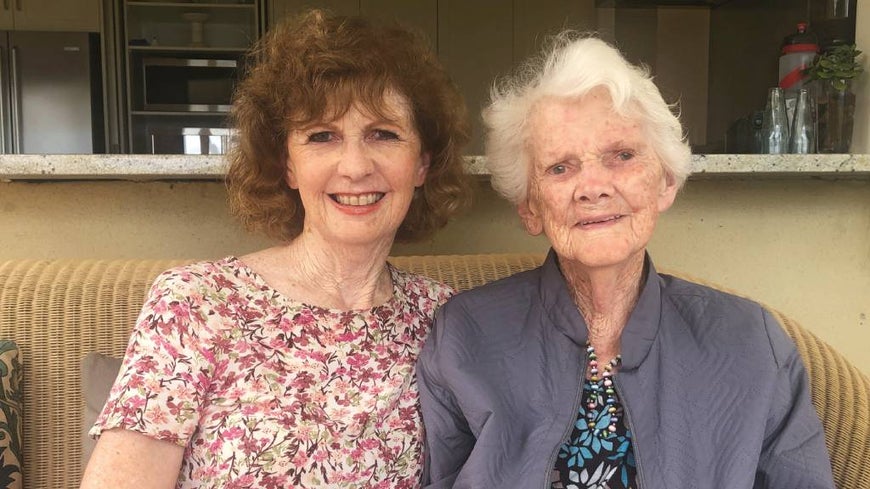Ways to record your loved ones’ stories

Written by Alex Speed for Australian Seniors
Pictured: Romayne Hayman, 67, who produced a magazine-format like story for her 100-year-old mother, Elaine Jennings.
If you’ve ever flicked through generations-old family photo albums and wondered about the stories reflected in the images, or rued not asking loved ones more about their lives and histories before it was too late, you’re not alone.
For Dimity Brassil, a shocking realisation dawned on her following the death of her father and then her sister in quick succession: “I realised I would never hear their voices, or them telling their stories in their own voice again.” The experience propelled Dimity to record her mother Anne’s story, and start a new venture to help others do the same. Describing it as a private podcast or radio show, A Lasting Tale captures audio recordings of a person speaking about their life as an audible lasting legacy.
Recording the voice of a loved one
“The first memory you lose when someone you love dies is the sound of their voice,” Dimity tells DARE. Her company employs journalists around the country to visit and record at the home of the person sharing their life’s memories. “We adapt the questions to what each person, or their family, wants to achieve out of the process.” There’s also an online option, for those not comfortable being interviewed in person.
The end result is a four-episode radio program with the storyteller’s favourite music and songs mixed into the commentary. “We try and cater for every generation listening to the story,” says Dimity. “The grandchildren get the podcast link, the children get the internet transfer and our storytellers get a USB gift box and a transcript of their interview.”
Documenting your own family’s history
Hearing a loved one’s story at their funeral service can be an important part of the healing process, and there is support available if you prefer to make your own recordings, rather than turning to a professional service. “If you want to go beyond the rehearsed and retold stories, to try and really understand your family history and its enduring legacies, then it’s a great idea to interview family members while you can,” says Alistair Thomson, emeritus professor of history at Monash University and president of Oral History Australia.
He recommends getting some basic training before you begin. “Each state oral history association offers beginner courses in how to prepare and create excellent oral history recordings.”
Of course, memorialising your loved one doesn’t need to be a complicated affair. It certainly wasn’t for Romayne Hayman, 67, who documented the life of her 100-year-old mother Elaine Jennings.
“My Nana, Mum’s mum, emigrated to Australia to marry my grandfather from England as a young woman, and growing up, I remember her writing all these intricate family histories in little red books because she was so far away from home,” says Romayne.
“And she wrote a note on all of the books saying, ‘I do hope that Elaine or one of my grandchildren might do something with all this material’, so Mum has always been conscious of this request.”
Creating a magazine
Romayne used her grandmother’s books, together with Elaine’s many scrapbooks, as well as countless hours of one-on-one interviews with her mother to write My Life: Elaine Jennings’ Story in a magazine format. She did this simply in Word, and had it printed at the local printers, with plans to produce around 60 copies of the ‘magazine’ for family and friends.
“I worked with a treasure trove of Mum’s memorabilia to pull together all the different strands of her life into a coherent story in her own voice, which the people who love her – her children and grandchildren – will be able to sit down with and go through,” she says. Helping Elaine relate the story of her life had benefits for Romayne, too. “It’s been a labour of love and tremendously therapeutic for me to relate Mum’s story from her point of view, and not simply as a parent, and for me to get to know Mum at a completely different level.” Even if you don't want to write a detailed magazine, a simple memory book can help preserve their life story and legacy for future generations.
Writing a memoir
As a genealogist and family historian, helping people get to know their family’s legacy on a whole new level is a significant part of Amanda Mackevicius’ work. The owner of My Genealogy is regularly commissioned by Australian families – particularly in business and agriculture – to research their history and write a memoir in hardback with her results.
Her work entails many hours of interviewing and painstaking research on the internet, in libraries and searching for official documents. “Memoirs are frequently initiated by the children and often the older people think, ‘Oh I don’t have anything to talk about’,” says Amanda, 58.
“But invariably they find that once they get into it, they absolutely love the process. And it’s a process that can be really important for them because it makes them think about what they are leaving behind, what they value and what stories they want to hold onto.”
Get the latest take on trending issues, smart tips to boost your financial goals, or a fresh way to indulge in everyday joys, all from the comfort of your favourite reading spot with DARE magazine from Australian Seniors.
DARE also features exclusive stories from some of Australia’s favourite personalities.
2 Sept 2024